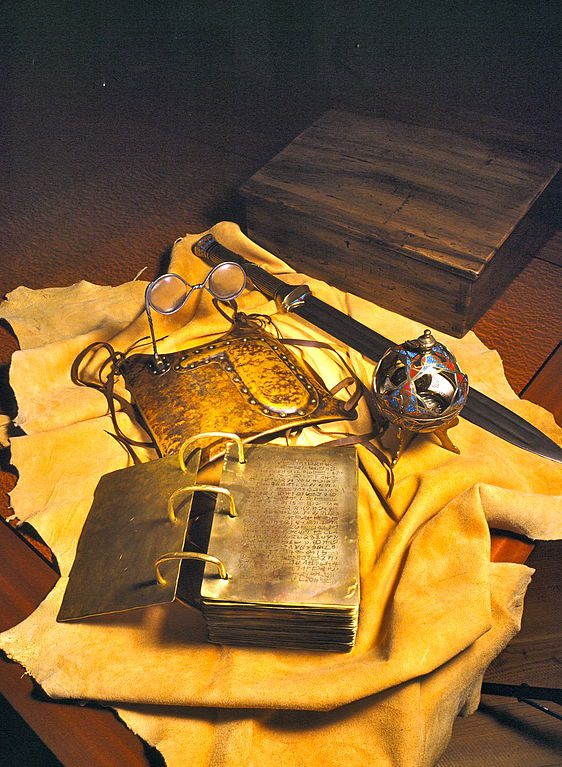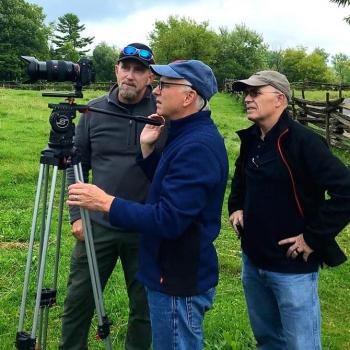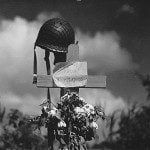
(Wikimedia CC: David A. Baird/Historical Arts and Castings)
I continue on with my notes from and/or inspired by John W . Welch, et al., eds., Knowing Why: 137 Evidences That the Book of Mormon Is True (American Fork: Covenant Communications, 2017). While I haven’t been providing links, most if not all of the articles from which I’m drawing here are available, so far as I’m aware, at Book of Mormon Central, a site (and an organization) that I highly recommend. But I’ll be entirely candid: I’m hoping to inspire people out there to buy and read the book itself. My brief comments here can’t begin to express the interesting riches that it offers.
“Why Did Nephi End His Sacred Record with His Testimony of the Redeemer?” (146-147)
Manifestly, at the close of his ministry and, indeed, of his life, he felt that bearing witness of Christ was the most important thing that he could do:
“I glory in plainness; I glory in truth; I glory in my Jesus, for he hath redeemed my soul from hell.” (2 Nephi 33:6)
“And we talk of Christ, we rejoice in Christ, we preach of Christ, we prophesy of Christ, and we write according to our prophecies, that our children may know to what source they may look for a remission of their sins.” (2 Nephi 25:26)
It is, I confess, simply beyond my comprehension that anybody can read such statements, which abound in the Book of Mormon, and conclude that the Book of Mormon and Mormonism (for which it is a foundational text) are not Christian.
“Why Did Jacob Quote So Much from Psalms?” (150-151)
At four different places, the Book of Mormon book of Jacob clearly draws words and phrases from three different Old Testament psalms. These are Psalms 95, 118, and 145. This is very significant, because (a) his brother, Nephi, had consecrated Jacob as a temple priest and teacher and because (b) those particular psalms are known especially for their having been used in ancient Israelite temple ritual and in later, derivative, Jewish ritual.
Here’s one specimen (and another example of the profound Christianity of the Book of Mormon):
“Wherefore we labored diligently among our people, that we might persuade them to come unto Christ, and partake of the goodness of God, that they might enter into his rest, lest by any means he should swear in his wrath they should not enter in, as in the provocation in the days of temptation while the children of Israel were in the wilderness.” (Jacob 1:7; compare Psalms 95:8)
This doesn’t seem the kind of thing that the young American frontier farm boy Joseph Smith would likely have known.
“What Does the Book of Mormon Say about Polygamy?” (152-153)
Famously, many nineteenth-century Latter-day Saints practiced “plural marriage.” Somewhat less famously, the Book of Mormon condemns polygamy:
“For if I will, saith the Lord of Hosts, raise up seed unto me, I will command my people [to practice plural marriage]; otherwise they shall hearken unto these things [namely, the commandment to be married and to have sexual relations with only one wife.” (Jacob 2:30; compare 3:5)
But the condemnation is neither comprehensive nor absolute. It seems, for instance, to allow for times when plural marriage might be divinely approved. Curiously, too, while Jacob condemns David and Solomon for their multiple marriages (which were, evidently, divinely unauthorized), he does not condemn the polygamist biblical patriarchs Abraham and Jacob (aka Israel).
The real object of his condemnation may, this article argues, be not so much plural marriage itself as rising class distinctions — marked by the amassing of wealth and wives.
“Why Did Jacob Call His Record the ‘Plates of Jacob’?” (154-155)
What I take away from this article is the sheer consistent complexity of the records from which, the text says of itself, the Book of Mormon was compiled. It would be very difficult for anybody, let alone for the barely educated Joseph Smith, to have kept all of the details straight. Yet they’ve been kept straight.











